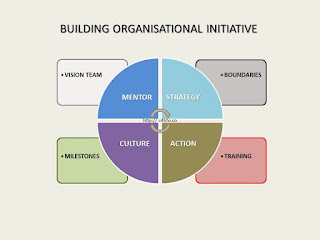Creating Initiative in a team!
Ordinary people find problems, above average people find solutions.
Were common sense really common, we would all be the better for it, sadly it’s not! What turns an average team into an above average team is having and taking the initiative.
Can people be trained to have initiative? Of course, but it’s always easier to just find and hire them. As a trainer, mentor and coach, I prefer the challenge of developing people to take initiative. I have always taken on apprentices in whatever organisations I have led. Interns, trainees, temporary staff, youth leaders, work experience and trade skills. The same rules apply. It requires initiative, to initiate initiative.
Either one provides a culture of initiative or the opposite of it will evolve. Humans have a propensity for taking the path of ease. Like water, we gravitate to the least point of resistance.
Regardless of team size, organisational resources, finances or skill set, the same principles apply. Individuals can implement the following strategies by engaging a coach or mentor to keep the accountability process fluid.
- Form a vision team
Ideas people are great! They bring colour and texture to the big picture. If you are personally threatened by someone dreaming bigger than you, it’s not for you. Creating a vision team will loosen the reigns and increase responsibility and resources. Detailed people are freaked out by such teams, (with the why, what, how, when and what if questions) which is why a Strategy team is a complimentary initiative.
- Establish why boundaries are a great resource
Good leaders that delegate do not give away authority lightly. Delegation must always carry with it accountability, with responsibility. It would be foolish to give your toddler a shiny new bike and let them use it whenever and however they chose. Learning to ride safely, requires insight with oversight until a relationship of trust serves both the rider and the gift.
- Establish a “no failures” culture
Unless we appreciate failure as a learning tool for success, we will instil fear of failure in those around us. Repetition is a learning process that empowers us through the familiarity of the process. This puts us at ease whilst building confidence. By persistence, the snail entered the ark
- Value training and development
Performers on a high wire act have all the freedom they want, but there are immutable forces at work that must be obeyed in order to complete the performance successfully. The difference between amateur and professional is training. If the budget does not prioritise consistent training, development ceases.
- Mentor mentors
People are more likely to initiate in others if they learn the key to being mentored themselves. Mentoring is relationship based and focused on instilling wisdom, experience and networks which support skill advancement. Every leader should develop leaders (see my site for pedagogy)
- Strategy team
Keep in mind that the purpose of these groups are to build initiative, which in turn develops ideas that will mobilize people. Visionaries gravitate to fellow visionaries, but without the strategists, what started out as a vision can quickly become a dream at best and a nightmare at worst. Imparting the vision to strategists with a clear preferable future is the leaders responsibility. Finding tangible ways to achieve the vision is the role of a strategy team. Accountability and responsibility for the outcome is not given away, as initiative evolves and ideas flow.
- Celebrate milestones together
Corporate celebration is critical in keeping the team focused and empowered. Public affirmation of “a job well done” is powerful, as is rewarding key initiatives. With over thirty years in training and development, I can concur; that teams who embrace positive and public affirmation of progress, build strong connections and ownership of the vision.
- Find it? Fix it!
Initiative is about responsible action, and the best way to initiate this initiative is burn it into the culture of the organisation. I once sought the advice of a seasoned leader in a large organisation, in regard to his selection process of his interns. His response was startling yet wise. He looked for individuals that voluntarily picked up litter and waste, or solved practical issues without being asked. Since then, I have made it a point of saying, “every problem YOU find, YOU are responsible for fixing”. No one else to blame, no one else to delegate to, (unless a specialist is required), initiative is about ACTION. Once this simple principle forms part of the organisations culture, initiative grows and ownership ensues.
Tony Mckeown is a director and owner of coaching 4 life ltd. His services span academic programme management, course design and moderation to public and private training organisations. He also provides itinerant ministry and leadership training for none profit organisations and churches world wide.
